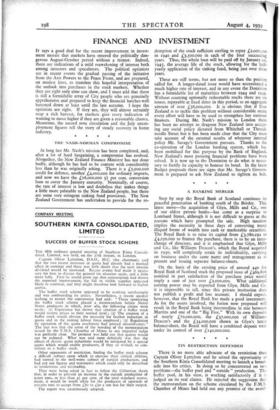COMPANY MEETING
SOUTHERN KINTA CONSOLIDATED, LIMITED
SUCCESS OF BUFFER STOCK SCHEME
THE fifth ordinary general meeting of Southern Kinta Consoli- dated, Limited, was held, on the 27th instant, in London.
Captain Oliver Lyttelton, D.S.O., M.C. (the chairman), said that the two recent increases in quota had already had a marked effect in earnings and there was little doubt that the next interim dividend would be increased. Recent events had made it neces- sary for him to discuss the general tin situation again, and a little more fully. First he would point out that consumption had shown the expected improvement, the fall in visible supplies appeared likely to continue, and they might therefore look forward to higher quotas.
The buffer stock scheme appeared to be working satisfactorily and was confounding its critics. Nevertheless, a recent speaker wishing to restart the controversy had said: " Those sponsoring the buffer stock scheme placed a memorandum before Malay States producers in which, inter alia, the following claims were made: (1) Experience has shown that creation of a buffer stock would restore prices to their normal level ; (2) The creation of a buffer stock would obviate the necessity for further reduction in quota and in the mining labour force employed ; (3) Regulation by operation of the quota machinery had proved unsatisfactory." The fact was that the sense of the wording of the memorandum issued by the F.M.S. Chamber of Mines to any impartial judge a as perfectly clear. No promise was held out that quotas would not be reduced. What was said most definitely was that the effects of drastic quota reductions would be mitigated by a special quota which would enable producers, if they so wished, to con- tribute to a buffer stock.
Other opponents of restriction, finding the buffer stock scheme a difficult subject upon which to exercise their critical abilities, had turned to the well-worn subject of outside production, and had put out figures and statements which could only be described as' tendentious and misleading.
They were being asked in fact to follow the Gilbertian thesis that, in order to prevent an increase in the outside production of 9,000 tons, or less than 41 per cent. of the total standard assess- ment, it would be worth while for the producers of upwards of 200,000 tons to accept from £80 to ao a ton less for their output.
The report was unanimously adopted.








































 Previous page
Previous page